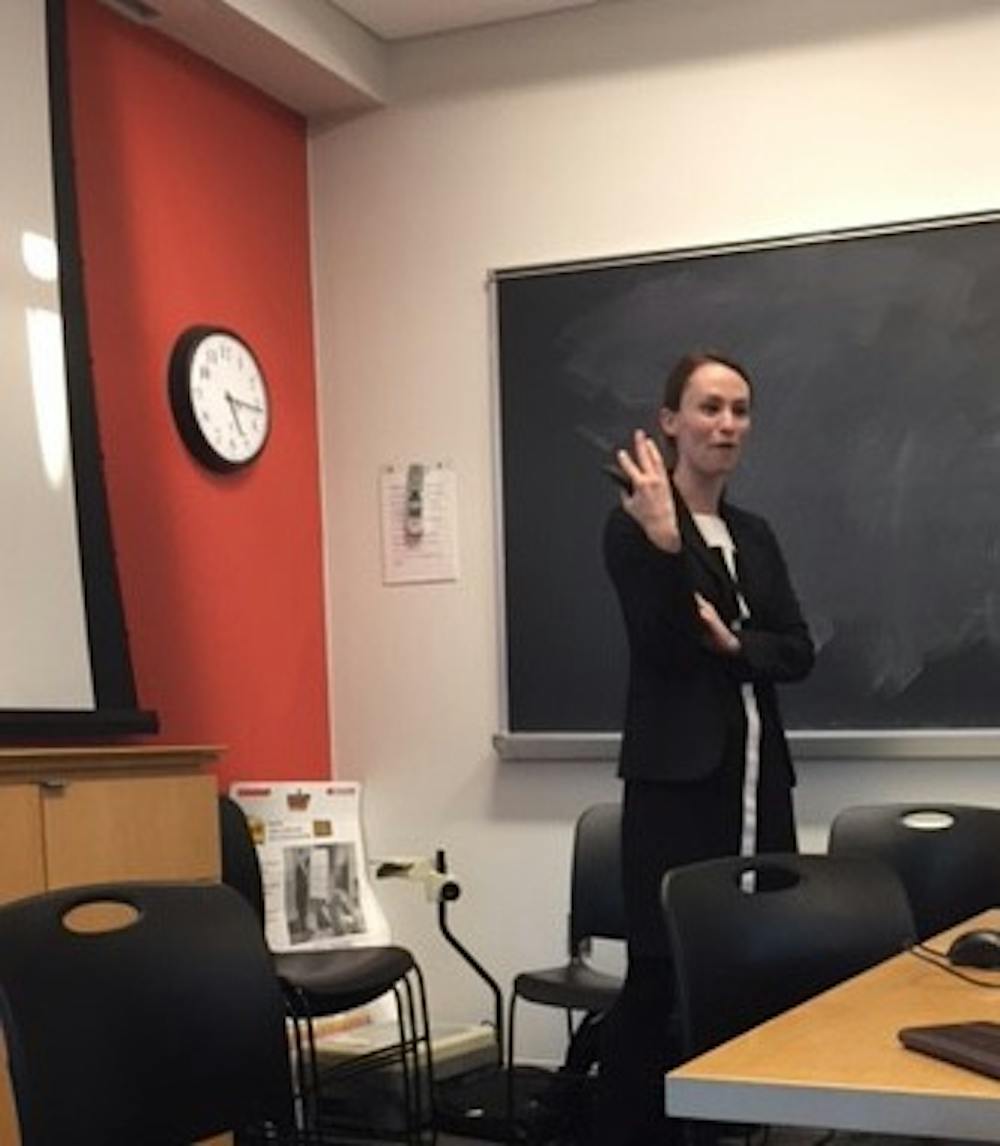In a public lecture on March 2, Dr. Sheena Chestnut Greitens, assistant professor of political science at the University of Missouri and First Lady of Missouri, spoke about increases in security spending in the People’s Republic of China from the late 20th century to present. Greitens is a leading scholar in comparative politics and international relations in East Asia.
In a small, densely packed room of professors, graduate students, and undergraduate students, Greitens challenged listeners to look beyond Western media projections of Chinese security spending and truly analyze released statistics.
She emphasized the need to depart from media preconceptions about Chinese security spending, as well as the need to carefully analyze what few numerical sources the Chinese government releases to the international community.
“The lecture that I am presenting today is focused on China,” Greitens explained, “but is also focused on trying to put some numbers that we often hear from China that we often hear in the media and the press and in the policy world in the cross national perspective and see what this means for China.”
Greitens began by rebutting the media-created gloom that appears to surround the rise of China’s security spending.
“The main interpretation is that these spending increases are evidence of strong and growing coercive capacity and repressiveness on the part of the Chinese party in the post-Tiananmen era,” Greitens said.
Greitens, however, argued that such evidence does not take into account China’s internal and external challenges, as well as the way that money is divided into Chinese coercive apparatus.
“To make quantifiable inferences about coercive capacity, what can you look at?” Greitens asked. “And I agree that we must look at what a country spends in an appropriate degree of context: what that money gets spent on, and what that money is spent against, or what is the magnitude of the challenge that money has to address and how is that shifting in the period we are talking about in changes in spending.”
Furthermore, Greitens prompted her audience to question if China is really different in spending levels, compared to other developed countries.
“You immediately run into the question, ‘Well, China is really different and it’s got a lot of relatively unique challenges.'" Greitens noted. “But in comparison with similar countries such as the U.S. and Russia, China spends less than both.”
Greitens asserted that the changing nature of Chinese society, from new governmental institutions to the rise in crime, has forced the Chinese government to focus on internal security spending.
“A lot of the institutions with migrations and other changes that were some of the Maoist link between state and public have really weakened,” she explained. “And it is not surprising to me that the formal governmental institutions of coercion would have to increase their resources to counter the institutions Mao’s China had used, which were compulsory and didn’t require spending money.”
Greitens continued to challenge listeners by encouraging them to imagine the challenges faced by Chinese domestic security officials.
“The challenges are what China [is] spending against and what China is trying to keep up with its coercive apparatus in the last twenty years. And the coercive apparatus is politically powerful but it does not necessarily give it more ability,” Greitens said. “Their power in the party position has risen, their power in the party system has risen, but not necessarily their ability to keep control of Chinese society.”
Greitens said that if she were a Chinese official, she would be worried.
“I would say, ‘I’m not sure we are keeping up. We are spending money, but we are not keeping up,’” she explained. “The issue is determining how these resources are being used, translating into the ability to control people and territory. So, it would make sense that China is expanding its control over social control over the state party and Chinese society, while keeping quiet about the numbers.”
Greitens finished by emphasizing the importance of measures of coercive capacity in budget and monetary numbers released by nations worldwide. She stressed the need for a cross-national effort to coordinate such informational releases.
“Coercive capacity is pretty essential to our ideas of when autocratic regimes rise and fall; when is there a coup?” Greitens said. “When does the military choose to side with the protestors or the autocrat? These fall under the nebulous term ‘coercive capacity.’ There are some organizational indicators as well as budget indicators such as the International Institute for Strategic Studies on a cross-national scale if we actually want to get a handle on domestic security and stability in both authoritarian and democratic countries.”
Greitens’ lecture was met with substantial consideration and approval.
Speaking about the lecture, Rory Truex, assistant professor of politics and public affairs, said, “[The lecture] overturns a standard conception of China — all of this budget increase is really an increase in coercive capacity and a response to normal crime and uncertainty. It challenges the existing conceptions that we see in the media with very good data and a very compelling presentation.”
The lecture was held in Wallace Hall at 4:30 p.m. and was hosted by the Center of International Studies at the Wilson School.





